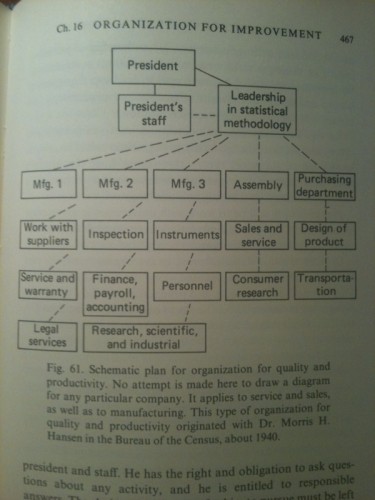Mark's note: I'm happy to welcome a relatively new friend, Mike Stoecklein, as a guest author here on my Lean Blog. We have shared interests in healthcare improvement and, particularly, in Dr. W. Edwards Deming, with whom Mike had personal experience. I'm glad he will share some of those experiences here.
 I am pleased to see the interest in the application of lean thinking in health care quality improvement. I'm also very fortunate to have the opportunity to play a role as a volunteer in the Health Care Value Leaders Network. The enthusiasm and optimism that I sense these days is reminiscent of my initial introduction to quality improvement in the mid 1980s.
I am pleased to see the interest in the application of lean thinking in health care quality improvement. I'm also very fortunate to have the opportunity to play a role as a volunteer in the Health Care Value Leaders Network. The enthusiasm and optimism that I sense these days is reminiscent of my initial introduction to quality improvement in the mid 1980s.
I began my career in health care as an orderly when I was just 18 years old.
Later, during my stint in the US Navy, I became a medical technologist and realized some my potential to try to make a contribution, but I also became aware of the frustrations of the workplace – the inefficiencies and the muda (although I did not know that term at the time). I thought that if I was to be able to address these challenges, I might need to prepare myself for a role in management. So, I pursued a degree in health care administration (UW Madison), while continuing to work full time as a medical technologist.
With the help of one of my statistics professors, I had the good fortune of meeting Dr. Deming when he came to visit Madison, Wisconsin during the early days of the Madison Area Quality Improvement Network (MAQIN). From then on, I knew that there was something here that interested me. I became like a sponge, taking in everything that I could on the topic. Dr. Deming was very generous with his time (in person and through correspondence through letters). Over a 10 year period, I had the opportunity to assist at a number of his 4-day seminars. There were lots of us who did this on a volunteer basis, and it was a very exciting time.
One thing that always struck me about Dr. Deming was his respect for everyone. When he spoke to you, it seemed like you were the most important person in the world. He seemed to always learn from everyone he interacted with, and he was always thankful for the opportunity to engage in a conversation around improving things.
If I had to identify some of the key lessons from Dr. Deming as it relates to healthcare improvement and lean thinking, I would offer these three:
1) Improvement will come as a result of “transformation of management“, nothing short of that will do. Transformation begins with the individual, and it is based on a system of profound knowledge (more on that with point #2). Once an individual understands this knowledge, they will apply it in every kind of relationship with other people. I hear the word “transformation” used when describing the scope of change at some health care organizations that are part of the Health Care Value Leaders Network and other organizations that are serious about the application of true lean thinking.
2) The kind of knowledge that is needed for improvement is not common and is not a product of our current education system. It comes from four components and their interactions: appreciation for a system, knowledge about variation, theory of knowledge and psychology. A person does not need to be expert in any of these components in order to apply it. It helps to have access to a person with this knowledge who can teach and advise all leaders in an organization, starting with senior management.
In his 1986 book, Out of the Crisis, Dr. Deming described the kind of structure that an organization might need in order to be organized for “quality and productivity” (Chapter 16). The schematic on page 467, below, includes a component described as “leadership in statistical methodology” which serves as advisor to the CEO, senior management and every component in the organization. I see some healthcare organizations accessing people with this knowledge in order to apply lean thinking and make transformational change possible in their organizations.
3) Managing an organization is not the same as managing the parts. Some people believe that organizations can be reduced to their parts, and the parts (if improved) will produce an improved whole. They treat the organization as if were additive (like a bowling team – where you can merely add up the scores of the individual players).
An example of this is benchmarking productivity of each department against similar peer departments and requiring the department to get better and better productivity. They don't understand that this approach will produce what Dr. Deming called “selfish profit centers”, each doing their best. A better approach is to study and improve the processes (value streams) in order to produce value to the customer.
I think that Dr. Deming would be very encouraged about the current efforts to improve the quality of health care. When I learn from others who are bringing the concepts of lean thinking to the health care system problems, it feels as though we are extending the application of knowledge that Dr.Deming and so many others articulated.
For my part, I'm trying to capture some of the things that I'm learning in my on-line journal – http://gembawalkabout.tumblr.com/. I would not describe this as a blog, but rather a summary of what I'm learning as I try to make a contribution to the healthcare improvement effort. I call my journal “gembawalkabout“. It's a combination of the terms “gemba walk” (to go to the actual place where value is added) + “walkabout” – an Australian aborigine word (a short period of wandering bush life engaged as an occasional interruption of regular work).
I don't believe that my walk will be a “short period of wandering” since I believe that to truly understand and apply the concepts described by Dr.Deming and others requires a life-long investment.
What do you think? Please scroll down (or click) to post a comment. Or please share the post with your thoughts on LinkedIn – and follow me or connect with me there.
Did you like this post? Make sure you don't miss a post or podcast — Subscribe to get notified about posts via email daily or weekly.
Check out my latest book, The Mistakes That Make Us: Cultivating a Culture of Learning and Innovation:











I, too, am a Deming disciple, having earned my MBA at Edgewood College in Madison under the tutelage of Professor Fazel Hayati. I did not have the chance to meet Dr. Deming, but met his protege, the late Peter Scholtes.
In my current capacity as the State’s Top Health Care regulator, I echo your sentiments about the transformation that is occurring in Wisconsin’s health care communities, most notably Theda Care in Northeast Wisconsin.
For many years now, I have beein applying the Deming QI models to our practices (processes), identifying those functions that do not add value, examining the Gemba, and using a valuable feedback system from external and internal stakeholders to improve our work and processes.
I’m pleased to have found you on the Internet and I look forward to more information coming from your organization.
Otis Woods, Administrator
Division of Quality Assurance
Wiscoinsin Department of Health Services